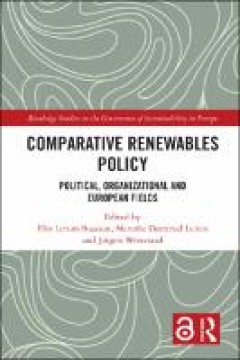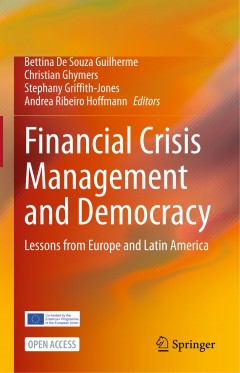Filter by

Economics without borders : economic research for European policy challenges
If treated as a single economy, the European Union is the largest in the world, with an estimated GDP of over 14 trillion euros. Despite its size, European economic policy has often lagged behind the rest of the world in its ability to generate growth and innovation. Much of the European economic research itself often trails behind that of the USA, which sets much of the agenda in mainstream ec…
- Edition
- -
- ISBN/ISSN
- 9781316636398
- Collation
- xxvi, 666 p. ; ill
- Series Title
- -
- Call Number
- 330.94 BLU e

The Great Reset: 2021 European Public Investment Outlook
This timely and insightful collection of essays written by economists from a range of academic and policy institutes explores the subject of public investment through two avenues. The first examines public investment trends and needs in Europe, addressing the initiatives taken by European governments to tackle the COVID-19 recession and to rebuild their economies. The second identifies key doma…
- Edition
- -
- ISBN/ISSN
- 9781800643529
- Collation
- xxvii, 222 p. : ill. ; 17.8 cm.
- Series Title
- -
- Call Number
- 332.64 CER t

Comparative renewables policy : political, organizational and European fields
Challenging one-eyed technology-focused accounts of renewables policy, this book provides a ground-breaking, deep-diving and genre-crossing longitudinal study of policy development. The book develops a multi-field explanatory approach, capturing inter-relationships between actors often analyzed in isolation. It provides empirically rich and systematically conducted comparative case studies on t…
- Edition
- -
- ISBN/ISSN
- 9780429198144
- Collation
- xvii, 259 p. : ill.
- Series Title
- Routledge Studies on the Governance of Sustainability in Europe
- Call Number
- 333.794094 BOA c

Brownshirt princess: a study of the 'nazi conscience'
Princess Marie Adelheid of Lippe-Biesterfeld was a rebellious young writer who became a fervent Nazi. Heinrich Vogeler was a well-regarded artist who was to join the German Communist Party. Ludwig Roselius was a successful businessman who had made a fortune from his invention of decaffeinated coffee. What was it about the revolutionary climate following World War I that induced three such diffe…
- Edition
- -
- ISBN/ISSN
- 9781906924089
- Collation
- 202 p. : ill. : ind. ; 24 cm
- Series Title
- -
- Call Number
- 831.912 GOS b

Cultural sovereignty beyond the modern state : space, objects, and media
In the past 25 years or more, political observers have diagnosed a crisis of the sovereign nation state and the erosion of state sovereignty through supranational institutions and the global mobility of capital, goods, information and labour. This edition of the European History Yearbook seeks to use "cultural sovereignty" as a heuristic concept to provide new views on these developments since …
- Edition
- -
- ISBN/ISSN
- 9783110679151
- Collation
- II, 181 p.
- Series Title
- Jahrbuch für Europäische Geschichte / European History Yearbook, Band 21
- Call Number
- 320.15 CUL c
Regional and Local Development in Times of Polarisation: Re-thinking Spatial …
Despite the emphasis of the European Regional Policy on territorial cohesion, regional disparities have been increasing within Europe in the past years. The metropolitan areas in almost all countries are considerably growing while regions outside of agglomerations are stagnating or even declining. Against this background this book aims to provide an understanding of the underlying processes of …
- Edition
- 1st ed. 2019.
- ISBN/ISSN
- 9789811311901
- Collation
- XXIV, 382 p
- Series Title
- -
- Call Number
- 304.2 REG r

Insurance distribution directive : a legal analysis
This open access volume of the AIDA Europe Research Series on Insurance Law and Regulation offers the first comprehensive legal and regulatory analysis of the Insurance Distribution Directive (IDD). The IDD came into force on 1 October 2018 and regulates the distribution of insurance products in the EU. The book examines the main changes accompanying the IDD and analyses its impact on insurance…
- Edition
- -
- ISBN/ISSN
- 9783030527389
- Collation
- xi, 439p. : ill.
- Series Title
- -
- Call Number
- 346.4086 INS i

Migrants, refugees and asylum seekers' integration in European labour markets…
This open access book discusses how, and to what extent, the legal and institutional regimes and the socio-cultural environments of a range of European countries (the Czech Republic, Denmark, Finland Greece, Italy, Switzerland and the UK), in the framework of EU laws and policies, have a beneficial or negative impact on the effective capacity of these countries to integrate migrants, refugees a…
- Edition
- -
- ISBN/ISSN
- 9783030672843
- Collation
- xi, 258p. : ill.
- Series Title
- -
- Call Number
- 331.62094 MIG m

"Truth" and fiction : conspiracy theories in Eastern European culture and lit…
Several of the most prolific and influential conspiracy theories originated in Eastern Europe. The efficacy of conspiracy narratives can be observed in recent developments in Poland or with regard to the wars waged in eastern Ukraine and in former Yugoslavia. This volume analyses the history behind this widespread phenomenon as well as its relationship with representations of the present in Eas…
- Edition
- -
- ISBN/ISSN
- 9783839446508
- Collation
- 381 p.
- Series Title
- Edition Kulturwissenschaft, 193
- Call Number
- 809.93355 TRU t

Financial crisis management and democracy : lessons from Europe and Latin Ame…
This open access book discusses financial crisis management and policy in Europe and Latin America, with a special focus on equity and democracy. Based on a three-year research project by the Jean Monnet Network, this volume takes an interdisciplinary, comparative approach, analyzing both the role and impact of the EU and regional organizations in Latin America on crisis management as well as t…
- Edition
- -
- ISBN/ISSN
- 9783030548957
- Collation
- ix, 382p. : ill.
- Series Title
- -
- Call Number
- 339 FIN f
 Computer Science, Information & General Works
Computer Science, Information & General Works  Philosophy & Psychology
Philosophy & Psychology  Religion
Religion  Social Sciences
Social Sciences  Language
Language  Pure Science
Pure Science  Applied Sciences
Applied Sciences  Art & Recreation
Art & Recreation  Literature
Literature  History & Geography
History & Geography